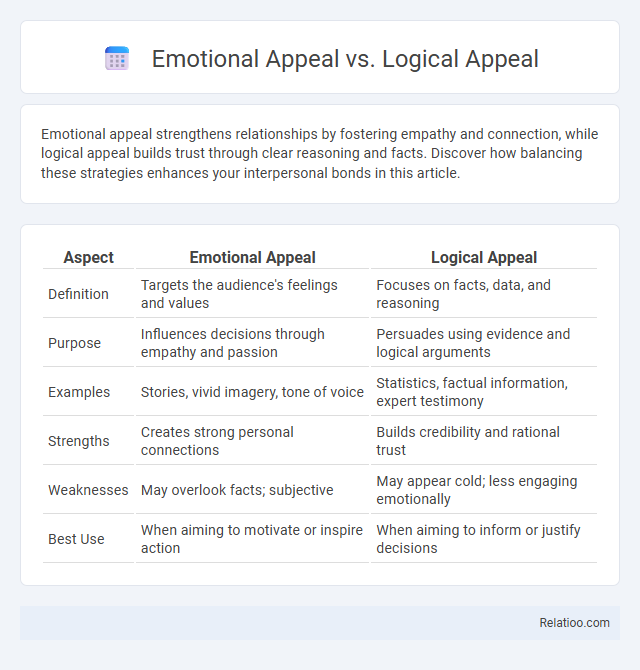Emotional appeal strengthens relationships by fostering empathy and connection, while logical appeal builds trust through clear reasoning and facts. Discover how balancing these strategies enhances your interpersonal bonds in this article.
Table of Comparison
| Aspect | Emotional Appeal | Logical Appeal |
|---|---|---|
| Definition | Targets the audience's feelings and values | Focuses on facts, data, and reasoning |
| Purpose | Influences decisions through empathy and passion | Persuades using evidence and logical arguments |
| Examples | Stories, vivid imagery, tone of voice | Statistics, factual information, expert testimony |
| Strengths | Creates strong personal connections | Builds credibility and rational trust |
| Weaknesses | May overlook facts; subjective | May appear cold; less engaging emotionally |
| Best Use | When aiming to motivate or inspire action | When aiming to inform or justify decisions |
Understanding Emotional Appeal
Emotional appeal targets the audience's feelings by evoking emotions such as fear, happiness, or empathy to create a connection and drive decision-making. This technique leverages storytelling, vivid imagery, and emotionally charged language to influence attitudes and behaviors effectively. Understanding emotional appeal is crucial for marketers, advertisers, and communicators seeking to engage audiences on a deeper, more persuasive level.
Defining Logical Appeal
Logical appeal, also known as logos, relies on reason and evidence to persuade an audience through facts, statistics, and rational arguments. It contrasts with emotional appeal, which targets feelings, and influence, which encompasses broader strategies including ethos, logos, and pathos. Effective logical appeals present clear, structured information designed to support claims and convince through objective proof.
Key Differences Between Emotional and Logical Appeals
Emotional appeal targets your feelings by using vivid language, personal stories, and evocative imagery to create a strong emotional response, while logical appeal relies on facts, statistics, and rational arguments to persuade through reason. Emotional appeals often engage the subconscious, making decisions feel intuitive, whereas logical appeals engage conscious thought, promoting careful analysis and evidence evaluation. Understanding these key differences helps you tailor your influence strategy to either evoke empathy or build credibility depending on your audience's needs.
Strengths of Emotional Appeal in Persuasion
Emotional appeal leverages the power of feelings to deeply connect with your audience, making messages more memorable and impactful by triggering empathy, passion, or fear. It strengthens persuasion by creating a strong psychological bond that can motivate immediate action, often bypassing rational skepticism. This approach excels in shaping attitudes and inspiring loyalty, especially when logic alone may fall short in swaying decisions.
Advantages of Logical Appeal in Argumentation
Logical appeal leverages facts, statistics, and clear reasoning to create persuasive and credible arguments that stand up to scrutiny. Your audience is more likely to trust and be convinced by evidence-based claims, enhancing the overall effectiveness of your communication. This method reduces emotional bias, making your message more objective and universally acceptable.
Common Uses of Emotional vs Logical Appeals
Emotional appeal targets your feelings and values to create a connection, often used in advertising, storytelling, and political campaigns to persuade audiences quickly and memorably. Logical appeal relies on facts, data, and rational arguments, making it effective in academic writing, legal cases, and technical presentations where credibility and evidence are crucial. Both approaches influence decision-making differently, with emotional appeals tapping into motivation and logical appeals building trust through reason.
Emotional Appeal in Advertising and Media
Emotional appeal in advertising leverages feelings such as happiness, fear, or nostalgia to create strong connections with consumers, enhancing brand recall and loyalty. Unlike logical appeal, which relies on facts and data, emotional appeal targets the audience's subconscious, driving impulse decisions and long-term attachment. Media campaigns utilizing emotional triggers often achieve higher engagement rates and persuasive impact, making them essential for effective marketing strategies.
Logical Appeal in Legal and Academic Writing
Logical appeal, or logos, is central to legal and academic writing, relying on clear, structured arguments supported by evidence, facts, and statistics to persuade the audience. This method emphasizes rationality and objective reasoning, enhancing credibility and fostering a strong foundation for claims or conclusions. Emotional appeals may supplement logical reasoning but remain secondary to ensure the argument maintains intellectual rigor and authority.
Balancing Emotional and Logical Appeals Effectively
Balancing emotional and logical appeals effectively requires integrating data-driven arguments with compelling storytelling to resonate with diverse audiences. Emotional appeal taps into values, beliefs, and feelings, while logical appeal uses statistics, facts, and evidence to establish credibility and reason. Successful influence leverages both by presenting clear, rational information alongside emotionally engaging narratives to motivate decision-making and action.
Choosing the Right Appeal for Your Audience
Understanding the differences between emotional appeal, logical appeal, and influence is crucial for crafting messages that resonate effectively. Emotional appeal targets the audience's feelings and values, while logical appeal relies on facts, data, and rational arguments to persuade. Choosing the right appeal for your audience depends on their preferences and context, ensuring your communication maximizes impact and drives desired actions.

Infographic: Emotional Appeal vs Logical Appeal
 relatioo.com
relatioo.com